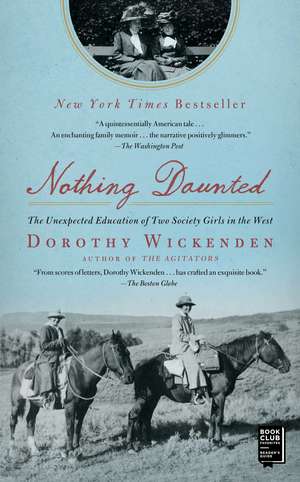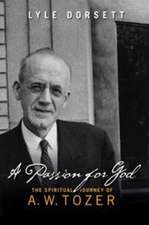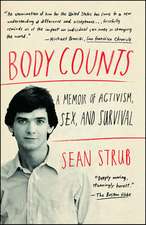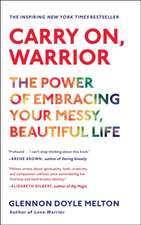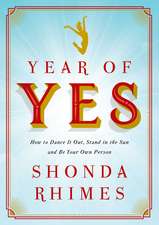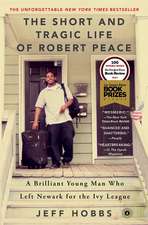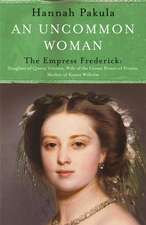Nothing Daunted: The Unexpected Education of Two Society Girls in the West
Autor Dorothy Wickendenen Limba Engleză Paperback – 6 iun 2012
Nearly 100 years later, Dorothy Wickenden came across the extraordinarily detailed letters these two women wrote to their families from Elkhead - about their teaching, the friends they made, the idiosyncratic characters they met, and their adventures throughout the county. Central to their narrative is Ferry Carpenter, the shrewd, witty, and occasionally outrageous young lawyer and cattle rancher who hired them, in part as attractive and cultivated brides for the locals. Drawing on the two stashes of letters, on interviews with Carpenter's son and with the children of the students at the school, and on visits to Elkhead herself, Wickenden creates an intimate, quirky story about two intrepid women who took off on an adventure that transformed their lives.
| Toate formatele și edițiile | Preț | Express |
|---|---|---|
| Paperback (1) | 108.00 lei 3-5 săpt. | |
| Scribner – 6 iun 2012 | 108.00 lei 3-5 săpt. | |
| Hardback (1) | 145.60 lei 3-5 săpt. | |
| Scribner – 20 iun 2011 | 145.60 lei 3-5 săpt. |
Preț: 108.00 lei
Nou
Puncte Express: 162
Preț estimativ în valută:
20.67€ • 21.50$ • 17.32£
20.67€ • 21.50$ • 17.32£
Carte disponibilă
Livrare economică 20 februarie-06 martie
Preluare comenzi: 021 569.72.76
Specificații
ISBN-13: 9781439176597
ISBN-10: 1439176590
Pagini: 336
Ilustrații: b-w photos
Dimensiuni: 140 x 214 x 23 mm
Greutate: 0.29 kg
Editura: Scribner
Colecția Scribner
ISBN-10: 1439176590
Pagini: 336
Ilustrații: b-w photos
Dimensiuni: 140 x 214 x 23 mm
Greutate: 0.29 kg
Editura: Scribner
Colecția Scribner
Notă biografică
Dorothy Wickenden is the author of Nothing Daunted and The Agitators and has been the executive editor of The New Yorker since January 1996. She also writes for the magazine and is the moderator of its weekly podcast The Political Scene. A former Nieman Fellow at Harvard, Wickenden was national affairs editor at Newsweek from 1993-1995, and before that was the longtime executive editor at The New Republic. She lives with her husband in Westchester, New York.
Recenzii
Praise for Nothing Daunted
"From the elite ethos of Smith College to the raw frontier of northwestern Colorado, two friends dared to defy the conventions of their time and station. Dorothy Wickenden tells their extraordinary story with grace and insight, transporting us back to an America suffused with a sense of adventure and of possibility. This is a wonderful book about two formidable women, the lives they led—and the legacy they left."—Jon Meacham, Pulitzer Prize-winning author of American Lion
“In Nothing Daunted, Dorothy Wickenden has beautifully captured a world in transition, a pivotal chapter not just in the life of her bold and spirited grandmother, but also in the life of the American west. Dorothy Woodruff and her friend Rosamond are like young women who walked out of a Henry James novel and headed west instead of east. Imagine Isabel Archer wrangling the ragged, half-wild children of homesteaders, whirling through dances with hopeful cowboys, and strapping on snowshoes in the middle of the night to urge a fallen horse onto an invisible trail in high snowdrifts, and you’ll have some idea of the intense charm and adventure of this remarkable book.”—Maile Meloy, author of Both Ways Is the Only Way I Want It
“A superb, stirring book. Through the eyes of two spirited and resourceful women from the civilized East, Wickenden makes the story of the American West engaging and personal. A delight to read.” —Susan Orlean, author of The Orchid Thief
“The adventures of two well-bred Yankee ladies in the still wild West makes a remarkable, funny story. But evoked through Dorothy Wickenden's skillful use of letters, diaries, and memoirs, Nothing Daunted is also a slow parade through young America. Cowboys carefully-mannered before the ladies; the bare-legged, ragged children in their brand-new school; winter sleigh rides under the new moon—all these moments have been preserved, their colors fresh for modern wonderment: A haunting evocation of a vanished world.”—Caroline Alexander, author of The Bounty and The War that Killed Achilles
“Dorothy Wickenden was lucky to have such intriguing forebears...but the satisfying depth and vivacity of Nothing Daunted, the intimate, report-from the ground American saga the author has created with that correspondence as a foundation, have nothing to do with good fortune. Wickenden’s talents for research, observation, description, and narrative flow turn this unfaded snapshot of these early-20th-century women in the West into something even more resonant—a brightly painted mural of America under construction a century ago, personified by two ladies of true grit who were nothing daunted and everything enthusiastic about where the new century would take them.”—Entertainment Weekly
“Wickenden has painstakingly recreated the story of how that earlier Dorothy and her friend Rosamond Underwood embarked on a brief but life-changing adventure, teaching the children of struggling homesteaders... Wickenden lets their tale of personal transformation open out to reveal the larger changes in the rough-and-tumble society of the West...Fascinating...scenes emerge with a lovely clarity”—Maria Russo, New York Times Book Review
“A superb biography... Wickenden summons up the last moments of frontier life, where books were a luxury and, when blizzards hit, homesteader’s children would ski miles to school on curved barrel staves... Nothing Daunted also reminds us that different strains of courage can be found, not just on the battlefield, but on the home front, too.”—Maureen Corrigan, Fresh Air
“An enchanting family memoir…A brilliant gem of Americana.”—Washington Post Book World
“Wickenden brings to life two women who otherwise might be lost to history and who took part in creating the modern-day West.”—Publishers Weekly
“A compelling story...”—Pittsburgh Post-Gazette
“Wickenden is a very good storyteller, and bracingly unsentimental. The sweep of the land and the stoicism of the people move her to some beautiful writing.”—Joan Acocella, Newsweek
"Wickenden uses personal history to illuminate the larger story of manifest destiny." —The New Yorker
"A great story, with a richly appealing character at the center...a tale of the triumph of determination over adversity...wonderfully American." —Slate
“Dorothy Woodruff and Rosamond Underwood come alive in Nothing Daunted, Dorothy Wickenden’s fascinating slice of social history... Their story is blessed with a cast of supporting characters that novelists would envy.”—USA Today
“Wickenden is a lucky and talented writer... Both women spring to life in this wonderful book.”—Houston Chronicle
“Lovingly pieced together.”—Los Angeles Times
“Scrupulously researched... Both an entertaining and an edifying read, bringing early 20th-century Colorado to vivid life.” —Bookpage
“Century-old letters composed in the wilds of Colorado by two young schoolteachers provide the backbone of this stirring narrative.” —Newsweek
“Dorothy Wickenden’s recounting of her grandmother Dorothy Woodruff’s treacherous cross-country journey is as charming as it is rugged... This is Little House on the Praire in petticoats, and it is enchanting.”—Rachel Syme, NPR.org
“Dorothy Wickenden has crafted an exquisite book.”—Boston Globe
“A rich narrative... Nothing Daunted is an extraordinary book.”—Denver Post
“An intimate and joyful work that captures the best spirit of the 1910s—and today.”—Shelf Awareness
“Woodruff’s breezy letters could easily have stood on their own, but Wickenden chose to shape them into a narrative...Her instinct was right: Nothing Daunted is at once enjoyable and enlightening.”—American Way
"From the elite ethos of Smith College to the raw frontier of northwestern Colorado, two friends dared to defy the conventions of their time and station. Dorothy Wickenden tells their extraordinary story with grace and insight, transporting us back to an America suffused with a sense of adventure and of possibility. This is a wonderful book about two formidable women, the lives they led—and the legacy they left."—Jon Meacham, Pulitzer Prize-winning author of American Lion
“In Nothing Daunted, Dorothy Wickenden has beautifully captured a world in transition, a pivotal chapter not just in the life of her bold and spirited grandmother, but also in the life of the American west. Dorothy Woodruff and her friend Rosamond are like young women who walked out of a Henry James novel and headed west instead of east. Imagine Isabel Archer wrangling the ragged, half-wild children of homesteaders, whirling through dances with hopeful cowboys, and strapping on snowshoes in the middle of the night to urge a fallen horse onto an invisible trail in high snowdrifts, and you’ll have some idea of the intense charm and adventure of this remarkable book.”—Maile Meloy, author of Both Ways Is the Only Way I Want It
“A superb, stirring book. Through the eyes of two spirited and resourceful women from the civilized East, Wickenden makes the story of the American West engaging and personal. A delight to read.” —Susan Orlean, author of The Orchid Thief
“The adventures of two well-bred Yankee ladies in the still wild West makes a remarkable, funny story. But evoked through Dorothy Wickenden's skillful use of letters, diaries, and memoirs, Nothing Daunted is also a slow parade through young America. Cowboys carefully-mannered before the ladies; the bare-legged, ragged children in their brand-new school; winter sleigh rides under the new moon—all these moments have been preserved, their colors fresh for modern wonderment: A haunting evocation of a vanished world.”—Caroline Alexander, author of The Bounty and The War that Killed Achilles
“Dorothy Wickenden was lucky to have such intriguing forebears...but the satisfying depth and vivacity of Nothing Daunted, the intimate, report-from the ground American saga the author has created with that correspondence as a foundation, have nothing to do with good fortune. Wickenden’s talents for research, observation, description, and narrative flow turn this unfaded snapshot of these early-20th-century women in the West into something even more resonant—a brightly painted mural of America under construction a century ago, personified by two ladies of true grit who were nothing daunted and everything enthusiastic about where the new century would take them.”—Entertainment Weekly
“Wickenden has painstakingly recreated the story of how that earlier Dorothy and her friend Rosamond Underwood embarked on a brief but life-changing adventure, teaching the children of struggling homesteaders... Wickenden lets their tale of personal transformation open out to reveal the larger changes in the rough-and-tumble society of the West...Fascinating...scenes emerge with a lovely clarity”—Maria Russo, New York Times Book Review
“A superb biography... Wickenden summons up the last moments of frontier life, where books were a luxury and, when blizzards hit, homesteader’s children would ski miles to school on curved barrel staves... Nothing Daunted also reminds us that different strains of courage can be found, not just on the battlefield, but on the home front, too.”—Maureen Corrigan, Fresh Air
“An enchanting family memoir…A brilliant gem of Americana.”—Washington Post Book World
“Wickenden brings to life two women who otherwise might be lost to history and who took part in creating the modern-day West.”—Publishers Weekly
“A compelling story...”—Pittsburgh Post-Gazette
“Wickenden is a very good storyteller, and bracingly unsentimental. The sweep of the land and the stoicism of the people move her to some beautiful writing.”—Joan Acocella, Newsweek
"Wickenden uses personal history to illuminate the larger story of manifest destiny." —The New Yorker
"A great story, with a richly appealing character at the center...a tale of the triumph of determination over adversity...wonderfully American." —Slate
“Dorothy Woodruff and Rosamond Underwood come alive in Nothing Daunted, Dorothy Wickenden’s fascinating slice of social history... Their story is blessed with a cast of supporting characters that novelists would envy.”—USA Today
“Wickenden is a lucky and talented writer... Both women spring to life in this wonderful book.”—Houston Chronicle
“Lovingly pieced together.”—Los Angeles Times
“Scrupulously researched... Both an entertaining and an edifying read, bringing early 20th-century Colorado to vivid life.” —Bookpage
“Century-old letters composed in the wilds of Colorado by two young schoolteachers provide the backbone of this stirring narrative.” —Newsweek
“Dorothy Wickenden’s recounting of her grandmother Dorothy Woodruff’s treacherous cross-country journey is as charming as it is rugged... This is Little House on the Praire in petticoats, and it is enchanting.”—Rachel Syme, NPR.org
“Dorothy Wickenden has crafted an exquisite book.”—Boston Globe
“A rich narrative... Nothing Daunted is an extraordinary book.”—Denver Post
“An intimate and joyful work that captures the best spirit of the 1910s—and today.”—Shelf Awareness
“Woodruff’s breezy letters could easily have stood on their own, but Wickenden chose to shape them into a narrative...Her instinct was right: Nothing Daunted is at once enjoyable and enlightening.”—American Way
Descriere
The exhilarating tale of two society girls from New York who leave home to teach on the Western Frontier in 1916.
Extras
Nothing Daunted
![]()
![]()
Miss Underwood (left), Miss Woodruff, and Elkhead students, 1916
One weekend afternoon in the fall of 2008, at the back of a drawer in my old wooden desk at home, I came across a folder I had forgotten. “Dorothy Woodruff Letters, Elkhead 1916–17.” My mother had given me the file when my children were young, and I had put it away, intending to look through it, but life had intervened. I glanced at the first letter. Dated Friday, July 28, 1916, it was written on the stationery of the Hayden Inn. At the top of the sheet was a photograph of a homely three-story concrete-block house with a few spindly saplings out front. The inn advertised itself as “The Only First-Class Hotel in Hayden.” Dorothy wrote: “My dearest family: Can you believe that I am actually far out here in Colorado? ”
She and her close friend, Rosamond Underwood, had grown up together in Auburn, New York. They had just arrived after a five-day journey and were preparing to head into a remote mountain range in the Rockies, to teach school in a settlement called Elkhead. Dorothy’s letter described their stop overnight in Denver, their train ride across the Continental Divide, and their introductions to the locals of Hayden, whom she described as “all agog” over them “and so funny.” One man could barely be restrained “from showing us a bottle of gall stones just removed from his wife!” She closed by saying, “They are all so friendly and kind—and we are thrilled by everything. We start now—four hours drive. Goodbye in haste. . . .”
Dorothy Woodruff was my grandmother. As I began reading the letters, I recognized her voice immediately, even though they were written by a young woman—twenty-nine years old, unmarried, belatedly setting out on her own. An avid correspondent, she captured the personalities of the people she met; the harsh landscape; her trials with a classroom of unruly young boys; and her devotion to Rosamond, known to my brothers and me as “Aunt Ros.” I also was struck by their unusually warm friendship with two men: the young lawyer and rancher who hired them, Farrington Carpenter; and Bob Perry, who was the supervisor of his father’s coal mine. They were eighteen hundred miles away from their families, and from decorous notions about relations between the sexes.
The letters revealed the contradictions of Dorothy’s upbringing. She was a daughter of the Victorian aristocracy. Her forebears, like Rosamond’s, were entrepreneurs and lawyers and bankers who had become wealthy during the Industrial Revolution. In 1906, the young women were sent to Smith, one of the earliest women’s colleges, and afterward, they were indulged for a year with a grand tour of Europe, during which they saw their first “aeroplane,” learned how to blow the foam off a mug of beer, expressed disdain for the paintings of Matisse, and watched Nijinsky dance. Then, like other girls of their background, they were expected to return home to marry, and marry well.
Yet they had grown up surrounded by the descendants of some of the most prominent reformers in American history, including the suffragists who organized the first women’s rights convention in Seneca Falls, fifteen miles west of Auburn; and the man who overturned barbaric penal practices at the Auburn state prison, Sing Sing, and penitentiaries across the country. Auburn was a stop on the Underground Railroad, and some of the families they knew had hidden runaway slaves in their basements. Dorothy’s grandfather lived next door to William Seward, President Lincoln’s secretary of state. One day when she was visiting my family in Weston, Connecticut, she recorded an oral history, speaking with unerring precision about her childhood and about her time in Colorado. Retrieving the transcript of the tape, I was reminded of the breathtaking brevity of America’s past.
I remember Dorothy as white-haired, impeccably attired, and sometimes stern. The second youngest of seven children, she grew up in a big hipped-roof clapboard house staffed by servants. Her bedroom and that of her younger sister, Milly, were in the nursery, reached by the back stairs. Raised largely by their nursemaid, they rarely stepped into the kitchen. When Dorothy’s four children were growing up, she didn’t know how to cook anything except creamed potatoes and hot cocoa. Every night she brushed her hair a hundred strokes with a French boar-bristle brush. She joked to us about her height—four feet eleven and shrinking every year. To reach her high mahogany four-poster bed, inherited from her parents, she had to use a footstool upholstered in needlepoint.
She gave me tips in etiquette: how to file my nails, how to set a formal table, how to avoid acting “common.” When I was a slouching teenager, she showed me how she had been taught to walk across the room with a book balanced on her head. On my eighteenth birthday, she wrote to me: “To be happy it is necessary to be constantly giving to others. I do not mean to give in work alone—but all of your self. That means interest in other people—not only by affection—but by kindness.” She didn’t like the fashions of the 1970s—curtains of hair, tie-dyed T-shirts, and tight bell-bottoms—and once told me haughtily, “I never wore a pair of trousers in my life.”
For all that, she was spirited and funny—not at all the deferential young woman she had been brought up to be. After she and Ros returned from Europe, they attended friends’ weddings, along with traditional luncheons and balls, but six years later, they were still uninterested in the suitors who were interested in them. Chafing at the rigid social routines and not getting anywhere with the ineffectual suffrage work they had taken on, they didn’t hesitate when they heard about two teaching jobs in Colorado. The nine months my grandmother spent there seemed to have shaped her as much as her entire youth in Auburn. She was full of expansive admiration for the hardworking people of Elkhead, and when she faced great personal difficulties of her own, she called to mind the uncomplaining endurance she had witnessed in the settlers and their children.
She and Ros, like other easterners going west, were time travelers, moving back to the frontier. Although they ventured out after the first settlers, and went by train rather than covered wagon, their destination felt more like 1870 than 1916. They took with them progressive ideas about education, technology, and women—and postcards from their travels abroad. The homesteaders—motley transplants from across the country, Europe, and Russia—lived almost twenty miles north of Hayden. Effectively cut off from modern life by poverty and the Rocky Mountains, the pioneers found the two women as exotic as Dorothy and Ros found them.
Although World War I was looming, such a cataclysm was unimaginable to Americans who knew nothing of combat. Dorothy sometimes talked disparagingly about her grandfather’s brother, who had avoided service in the Civil War by paying a substitute to take his place—a common practice among wealthy families in the North. Just weeks before Dorothy and Ros left for Colorado, President Wilson averted war with Mexico. The prevailing spirit among the elites of Auburn, the industrialists of Denver, and the homesteaders of Elkhead was an exhilarating optimism about the future.
These people were swept up in some of the strongest currents of the country’s history: the expulsion of native tribes; the mining of gold, silver, and coal; the building of a network of railroads that linked disparate parts of the country and led to the settlement of the West; the development of rural schools; the entry of immigrants, African-Americans, and women into the workforce and the voting booth; even the origins of modern dance. Their lives were integral to the making of America, yet the communities they built, even their idioms, had all but vanished.
As I got to know the children and grandchildren of the people my grandmother told us about, I began to see her story as more than a curious family history. It was an alternative Western. There were strutting cowboys and eruptions of violence, but the records the residents left behind turned out to be full of their own indelible characters and plot twists. Dozens of descendants in Denver, Steamboat Springs, Hayden, Elkhead, and Oak Creek had kept their family memorabilia from that year. Rebecca Wattles, a rancher in Hayden and the granddaughter of the secretary of the Elkhead school board, showed me the 1920 yearbook of the first five graduates of the school, all of whom had been Ros’s students. They wrote: “It isn’t the easiest thing in the world to buck trail for two or three miles when the trail is drifted and your horse lunges and plunges; nor yet to ski, when the snow is loose and sticky. But, if as we are told, it is these things that develop grit, stick-to-it-ive-ness, and independence—well, the children who have gone to school in Elk Head, ought surely to have a superfluous amount of those qualities.”
One Sunday in early October 2009, my husband and I pulled up to an old white Georgian house on a cul-de-sac in Norwalk, Connecticut. We were greeted at the front door by Peter Cosel, one of Ros’s grandsons. He appeared to be mildly amused by my mission: a search for the letters that Rosamond had written from Elkhead. For a year I had been pestering him about going through the boxes he had in storage there. Peter called his brother Rob, also a lawyer, who arrived just as we finished a cursory examination of the attic treasures, including a trunk filled with papers dating back to the 1850s from a branch of the Underwood family that had settled in Chicago.
I sat on the floor in front of a sagging box, blackened on the bottom from mildew and eaten away in spots by a squirrel, and began to unpack it, setting aside a stack of five-year diaries—fastidious chronicles by Ros’s mother of her family’s daily life in Auburn. Peter absently combed through some business documents of his great-grandfather’s, a man named Sam Perry, who—I soon learned—was one of Denver’s “empire builders,” a financier of the railroad that Dorothy and Ros rode over the Continental Divide. Rob sat on the edge of the bed and talked about childhood visits to their grandmother’s rustic summer cabin in the hills of Strawberry Park outside Steamboat Springs. Then my husband handed me a two-page typewritten letter. In the upper-right corner, it said, “Saturday Night. Aug. 6.” I looked at the closing: “Dotty and I can hardly believe that this school is really ours to command! . . . Lovingly ROSAMOND.”
Ros’s entire correspondence was there, each letter typed, folded, and numbered by her mother. The letters had been written to her parents, who, like Dorothy’s, had left them for her children and grandchildren. Unwinding the string of a thick legal envelope, I looked inside. It contained dozens of articles and letters from October 1916. They confirmed the most improbable of all the tales my grandmother had told us, about the violent kidnapping of one of their friends. Sensational headlines were spread across the front pages from Denver to Los Angeles: HOW THE MILLIONAIRE’S SON WAS KIDNAPPED AND HELD FOR RANSOM; EXTRA! KIDNAPPER IS SLAIN.
All of these papers and recollections, with their idiosyncratic details about the “settling up” of northwestern Colorado, provided a backstory to America’s leap into the twentieth century. And they filled out the saga about two cosseted women from New York who shunned convention to head out to what was still, in many ways, the Wild West.
PROLOGUE
Miss Underwood (left), Miss Woodruff, and Elkhead students, 1916
One weekend afternoon in the fall of 2008, at the back of a drawer in my old wooden desk at home, I came across a folder I had forgotten. “Dorothy Woodruff Letters, Elkhead 1916–17.” My mother had given me the file when my children were young, and I had put it away, intending to look through it, but life had intervened. I glanced at the first letter. Dated Friday, July 28, 1916, it was written on the stationery of the Hayden Inn. At the top of the sheet was a photograph of a homely three-story concrete-block house with a few spindly saplings out front. The inn advertised itself as “The Only First-Class Hotel in Hayden.” Dorothy wrote: “My dearest family: Can you believe that I am actually far out here in Colorado? ”
She and her close friend, Rosamond Underwood, had grown up together in Auburn, New York. They had just arrived after a five-day journey and were preparing to head into a remote mountain range in the Rockies, to teach school in a settlement called Elkhead. Dorothy’s letter described their stop overnight in Denver, their train ride across the Continental Divide, and their introductions to the locals of Hayden, whom she described as “all agog” over them “and so funny.” One man could barely be restrained “from showing us a bottle of gall stones just removed from his wife!” She closed by saying, “They are all so friendly and kind—and we are thrilled by everything. We start now—four hours drive. Goodbye in haste. . . .”
Dorothy Woodruff was my grandmother. As I began reading the letters, I recognized her voice immediately, even though they were written by a young woman—twenty-nine years old, unmarried, belatedly setting out on her own. An avid correspondent, she captured the personalities of the people she met; the harsh landscape; her trials with a classroom of unruly young boys; and her devotion to Rosamond, known to my brothers and me as “Aunt Ros.” I also was struck by their unusually warm friendship with two men: the young lawyer and rancher who hired them, Farrington Carpenter; and Bob Perry, who was the supervisor of his father’s coal mine. They were eighteen hundred miles away from their families, and from decorous notions about relations between the sexes.
The letters revealed the contradictions of Dorothy’s upbringing. She was a daughter of the Victorian aristocracy. Her forebears, like Rosamond’s, were entrepreneurs and lawyers and bankers who had become wealthy during the Industrial Revolution. In 1906, the young women were sent to Smith, one of the earliest women’s colleges, and afterward, they were indulged for a year with a grand tour of Europe, during which they saw their first “aeroplane,” learned how to blow the foam off a mug of beer, expressed disdain for the paintings of Matisse, and watched Nijinsky dance. Then, like other girls of their background, they were expected to return home to marry, and marry well.
Yet they had grown up surrounded by the descendants of some of the most prominent reformers in American history, including the suffragists who organized the first women’s rights convention in Seneca Falls, fifteen miles west of Auburn; and the man who overturned barbaric penal practices at the Auburn state prison, Sing Sing, and penitentiaries across the country. Auburn was a stop on the Underground Railroad, and some of the families they knew had hidden runaway slaves in their basements. Dorothy’s grandfather lived next door to William Seward, President Lincoln’s secretary of state. One day when she was visiting my family in Weston, Connecticut, she recorded an oral history, speaking with unerring precision about her childhood and about her time in Colorado. Retrieving the transcript of the tape, I was reminded of the breathtaking brevity of America’s past.
I remember Dorothy as white-haired, impeccably attired, and sometimes stern. The second youngest of seven children, she grew up in a big hipped-roof clapboard house staffed by servants. Her bedroom and that of her younger sister, Milly, were in the nursery, reached by the back stairs. Raised largely by their nursemaid, they rarely stepped into the kitchen. When Dorothy’s four children were growing up, she didn’t know how to cook anything except creamed potatoes and hot cocoa. Every night she brushed her hair a hundred strokes with a French boar-bristle brush. She joked to us about her height—four feet eleven and shrinking every year. To reach her high mahogany four-poster bed, inherited from her parents, she had to use a footstool upholstered in needlepoint.
She gave me tips in etiquette: how to file my nails, how to set a formal table, how to avoid acting “common.” When I was a slouching teenager, she showed me how she had been taught to walk across the room with a book balanced on her head. On my eighteenth birthday, she wrote to me: “To be happy it is necessary to be constantly giving to others. I do not mean to give in work alone—but all of your self. That means interest in other people—not only by affection—but by kindness.” She didn’t like the fashions of the 1970s—curtains of hair, tie-dyed T-shirts, and tight bell-bottoms—and once told me haughtily, “I never wore a pair of trousers in my life.”
For all that, she was spirited and funny—not at all the deferential young woman she had been brought up to be. After she and Ros returned from Europe, they attended friends’ weddings, along with traditional luncheons and balls, but six years later, they were still uninterested in the suitors who were interested in them. Chafing at the rigid social routines and not getting anywhere with the ineffectual suffrage work they had taken on, they didn’t hesitate when they heard about two teaching jobs in Colorado. The nine months my grandmother spent there seemed to have shaped her as much as her entire youth in Auburn. She was full of expansive admiration for the hardworking people of Elkhead, and when she faced great personal difficulties of her own, she called to mind the uncomplaining endurance she had witnessed in the settlers and their children.
She and Ros, like other easterners going west, were time travelers, moving back to the frontier. Although they ventured out after the first settlers, and went by train rather than covered wagon, their destination felt more like 1870 than 1916. They took with them progressive ideas about education, technology, and women—and postcards from their travels abroad. The homesteaders—motley transplants from across the country, Europe, and Russia—lived almost twenty miles north of Hayden. Effectively cut off from modern life by poverty and the Rocky Mountains, the pioneers found the two women as exotic as Dorothy and Ros found them.
Although World War I was looming, such a cataclysm was unimaginable to Americans who knew nothing of combat. Dorothy sometimes talked disparagingly about her grandfather’s brother, who had avoided service in the Civil War by paying a substitute to take his place—a common practice among wealthy families in the North. Just weeks before Dorothy and Ros left for Colorado, President Wilson averted war with Mexico. The prevailing spirit among the elites of Auburn, the industrialists of Denver, and the homesteaders of Elkhead was an exhilarating optimism about the future.
These people were swept up in some of the strongest currents of the country’s history: the expulsion of native tribes; the mining of gold, silver, and coal; the building of a network of railroads that linked disparate parts of the country and led to the settlement of the West; the development of rural schools; the entry of immigrants, African-Americans, and women into the workforce and the voting booth; even the origins of modern dance. Their lives were integral to the making of America, yet the communities they built, even their idioms, had all but vanished.
As I got to know the children and grandchildren of the people my grandmother told us about, I began to see her story as more than a curious family history. It was an alternative Western. There were strutting cowboys and eruptions of violence, but the records the residents left behind turned out to be full of their own indelible characters and plot twists. Dozens of descendants in Denver, Steamboat Springs, Hayden, Elkhead, and Oak Creek had kept their family memorabilia from that year. Rebecca Wattles, a rancher in Hayden and the granddaughter of the secretary of the Elkhead school board, showed me the 1920 yearbook of the first five graduates of the school, all of whom had been Ros’s students. They wrote: “It isn’t the easiest thing in the world to buck trail for two or three miles when the trail is drifted and your horse lunges and plunges; nor yet to ski, when the snow is loose and sticky. But, if as we are told, it is these things that develop grit, stick-to-it-ive-ness, and independence—well, the children who have gone to school in Elk Head, ought surely to have a superfluous amount of those qualities.”
One Sunday in early October 2009, my husband and I pulled up to an old white Georgian house on a cul-de-sac in Norwalk, Connecticut. We were greeted at the front door by Peter Cosel, one of Ros’s grandsons. He appeared to be mildly amused by my mission: a search for the letters that Rosamond had written from Elkhead. For a year I had been pestering him about going through the boxes he had in storage there. Peter called his brother Rob, also a lawyer, who arrived just as we finished a cursory examination of the attic treasures, including a trunk filled with papers dating back to the 1850s from a branch of the Underwood family that had settled in Chicago.
I sat on the floor in front of a sagging box, blackened on the bottom from mildew and eaten away in spots by a squirrel, and began to unpack it, setting aside a stack of five-year diaries—fastidious chronicles by Ros’s mother of her family’s daily life in Auburn. Peter absently combed through some business documents of his great-grandfather’s, a man named Sam Perry, who—I soon learned—was one of Denver’s “empire builders,” a financier of the railroad that Dorothy and Ros rode over the Continental Divide. Rob sat on the edge of the bed and talked about childhood visits to their grandmother’s rustic summer cabin in the hills of Strawberry Park outside Steamboat Springs. Then my husband handed me a two-page typewritten letter. In the upper-right corner, it said, “Saturday Night. Aug. 6.” I looked at the closing: “Dotty and I can hardly believe that this school is really ours to command! . . . Lovingly ROSAMOND.”
Ros’s entire correspondence was there, each letter typed, folded, and numbered by her mother. The letters had been written to her parents, who, like Dorothy’s, had left them for her children and grandchildren. Unwinding the string of a thick legal envelope, I looked inside. It contained dozens of articles and letters from October 1916. They confirmed the most improbable of all the tales my grandmother had told us, about the violent kidnapping of one of their friends. Sensational headlines were spread across the front pages from Denver to Los Angeles: HOW THE MILLIONAIRE’S SON WAS KIDNAPPED AND HELD FOR RANSOM; EXTRA! KIDNAPPER IS SLAIN.
All of these papers and recollections, with their idiosyncratic details about the “settling up” of northwestern Colorado, provided a backstory to America’s leap into the twentieth century. And they filled out the saga about two cosseted women from New York who shunned convention to head out to what was still, in many ways, the Wild West.
